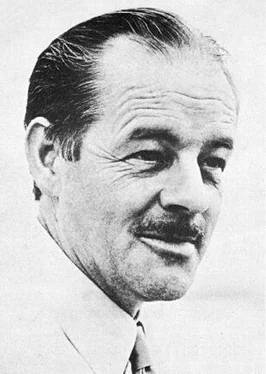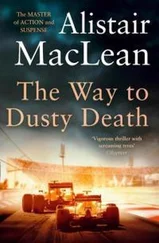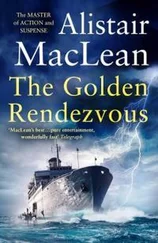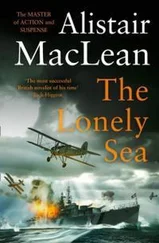Two men came forward to meet us. General Ruthven did the honours: ‘Martin Jerrold, our field foreman, Tom Harrison, our petroleum engineer. Gentlemen, this is John Smith, a specialist engineer flown out from England to help Mr Vyland in his research.’ John Smith, I gathered, was the inspired choice of name for myself.
Both men made perfunctory noises of greeting. Larry prodded me in the back so I said I was delighted too, but they obviously had no interest at all in me. Both men looked worried and uneasy, and both men were doing their best to conceal the fact. But the general didn’t miss it.
‘Something bothering you, Harrison?’ Out here on the rig it was obviously the policy for Vyland to keep very much in the background.
‘Very much so, sir.’ Harrison, a crew-cut youngster with heavy horn-rimmed spectacles, looked to me as if he should still be in college, but he must have been good to hold down the responsible job he did. He produced a small chart, spread it out and pointed with a carpenter’s pencil. ‘This chart’s good, General Ruthven. It couldn’t be better, and Pride and Honeywell are the best geological team in the business. But we’re already twelve hundred feet overdue. We should have hit oil at least five hundred feet back. But there’s not even a smell of gas yet. I can’t even begin to explain it, sir.’
I could have explained it, but it was hardly the time.
‘Those things happen, my boy,’ the general said easily. I had to admire the old coot; I was beginning to have more than a fair idea of the almost inhuman strain he was labouring under, but the control, the self-possession were admirable. ‘We’re lucky if we make it two out of five. And no geologist would claim to be 100 per cent accurate, or even within shouting distance of it. Give it another thousand. The responsibility’s mine.’
‘Thank you, sir.’ Harrison looked relieved, but there was still a certain uneasiness about him and the general was quick to get on to it.
‘Still something worrying you, Harrison?’
‘No, sir, of course not.’ He was too quick, too emphatic, he wasn’t half the actor the old boy was. ‘Nothing at all.’
‘Hmm.’ The general considered him thoughtfully, then looked at Jerrold. ‘Something on your mind, too?’
‘The weather, sir.’
‘Of course.’ The general nodded understandingly. ‘Latest reports are that Hurricane Diane is going to hit Marble Springs fair and square. And that means the X 13. You don’t have to ask me, Jerrold. You know that. You’re the captain of this ship, I’m only a passenger. I don’t like losing ten thousand dollars a day, but you must suspend drilling the moment you think it’s right to.’
‘It’s not that, sir,’ Jerrold said unhappily. He jerked a thumb over his shoulder. ‘That experimental leg you’re working on, sir – shouldn’t it be lowered to give maximum stability?’
So the drilling crew did know there was something going on in that pillar I’d investigated the previous night. When I came to think of it, although it wasn’t inevitable that they should know, it was advisable. So much easier to give the crew a specious explanation for the activities taking place there than to cordon off a section and raise suspicion and unwanted and possibly dangerous speculation. I wondered what sort of yarn had been spun to them. I was to find that out right away.
‘Vyland?’ The general had turned to the man by his side and raised a questioning eyebrow.
‘I’ll accept full responsibility, General Ruthven.’ He spoke in the quiet, precise, confident tones that a top-flight engineer might have employed, although it would have surprised me if he knew a nut from a bolt. But he could use reason, too, for he added: ‘This storm is going to hit from the west and the maximum strain is going to be on the other, the landward, side. The effect on this side will merely be to lift it.’ He made a deprecating gesture. ‘It does seem rather pointless, doesn’t it, to lower an additional leg just when the other legs on that same side will have far less strain than normal to carry? Besides, General, we are now so near the perfection of this technique which is going to revolutionize underwater drilling that it would be a crime to set it back, maybe several months, by lowering the leg and perhaps destroying all our delicate equipment.’
So that was the line. It was well done, I had to admit: the dedicated enthusiasm in his voice was so exactly right, without being in any way overdone.
‘That’s good enough for me,’ Jerrold said. He turned back to the general. ‘Coming across to your quarters, sir?’
‘Later. To eat, but don’t wait lunch for us. Order it for my stateroom, will you? Mr Smith here is keen to get to work right away.’ Like hell I was.
We left them and made our way down a broad passage. Deep inside the platform here the sound of the wind and the rising waves crashing and breaking against the pillars was completely inaudible. Perhaps some faint murmur of sound might have been heard if the air in that brightly-lit steel passage hadn’t been filled with the hum of powerful generators: we appeared to be passing by some diesel engine room.
At the far end of the passage we turned left and walked almost to its far cul-de-sac limits before stopping outside a door on the right-hand side. On this door, printed in large white letters, was the legend: ‘Drilling Research Project’ followed, in letters scarcely less large, by the words: ‘Private. Most Secret. Positively No Admittance’.
Vyland rapped on the door in a long code knock – I made a mental note of it: four shorts, two long, four shorts – waited till there came three long knocks from the inside, then knocked again, four times in rapid succession. Ten seconds later we had all passed through the door and it was double locked and bolted behind us. It made all the signs about ‘Private’ and ‘No Admittance’ seem rather superfluous.
Steel floor, steel bulkheads, steel ceiling, it was a black cheerless box of a room. At least, three sides of it formed a box – the bulkhead we’d just passed through, the blank bulkhead on the left and the one to the right, with a high grilled door in its centre. The fourth side was convex, bulging out into the room in an almost perfect semicircle, with a butterfly-clamped hatchway in its middle: the trunking, I felt certain, of the big steel pillar reaching down to the floor of the sea. On either side of the hatchway hung large drums with neatly coiled rubber tubes armoured in flexible steel. Below each drum, and bolted to the floor, was a large motor: the one on the right was, I knew, an air compressor – that’s what I’d heard when I’d been out there during the night – and the one on the left probably a forced-suction water pump. As for the furnishings of the room, even the Spartans would have found it rugged: a deal table, two benches and a metal wall-rack.
There were two men in the room – the one who had opened the door and another sitting at the table, dead cigar in his mouth and a pack of greasy cards spread out on the table in front of him – and both cast in the same mould. It wasn’t the fact that they were both shirt-sleeved and had leather holsters strapped across their chests and high up on their left sides that gave them close similarity, not even their evenly-matched height and weight and broad bulky shoulders. The sameness lay in their faces, hard expressionless faces with cold, still, watchful eyes. I’d seen men out of the same mould before, the top-notch professionals of the strong-arm underworld, all that Larry would have given his life to be and could never hope to be. They were so exactly the type of men I would have expected Vyland to employ that the presence of Larry was all the more mysterious indeed.
Читать дальше
Конец ознакомительного отрывка
Купить книгу












